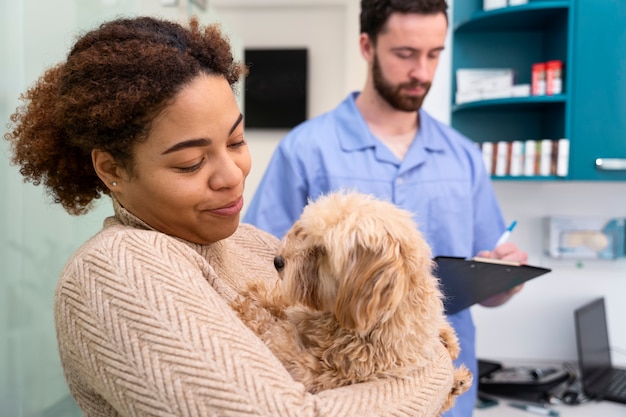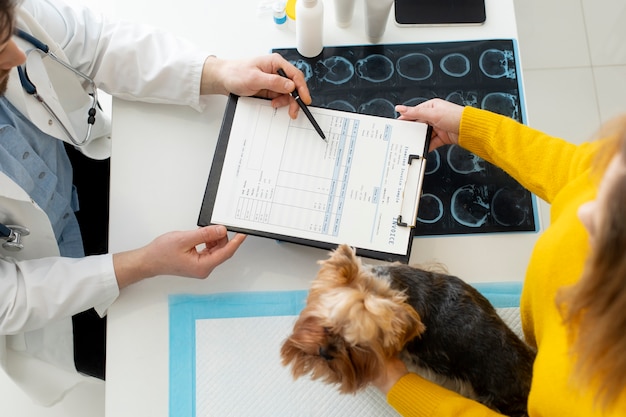Back-to-School Tips: Reducing Pet Stress During Fall Schedule Changes


Back-to-School Tips: Reducing Pet Stress During Fall Schedule Changes
As the vibrant days of summer draw to a close and families in Flemington and surrounding communities return to their autumn routines, many pet owners notice subtle changes in their furry or feathered companions. The new school year can bring excitement and fresh starts for people, but for pets, these changes often translate into confusion or anxiety. Whether you share your home with a playful pup, a curious cat, or a unique exotic pet, understanding how to minimize pet stress during schedule changes is key to a smooth transition into fall. At Clover Hill Animal Hospital, located at 240 US 202, Flemington, NJ 08822, our veterinary team is committed to supporting your entire family as routines shift. In this blog, we will explore why pets react to seasonal changes, identify signs of stress, and outline practical autumn pet care tips to help keep your companions feeling safe and secure. You will also discover when it’s time to seek professional guidance and how a wellness care visit can make a difference for your pet’s emotional health during the back-to-school season.
Recognizing the Signs: Is Your Pet Experiencing Stress During Fall Schedule Changes?
Pets are creatures of habit, and even minor disruptions in their daily lives can cause anxiety. As family members head back to school or work, pets may find themselves alone more often or faced with a quieter house. Dogs, cats, and exotic pets all show stress differently, but there are some common signs to watch for that indicate your companion may be having trouble adjusting to the new routine.
Key symptoms of pet stress during schedule changes include increased vocalization such as barking, meowing, or screeching, changes in appetite that might be seen as reduced interest in food or overeating, and altered sleep patterns like restlessness or excessive sleeping. Additionally, you might notice more clinginess or, in contrast, withdrawal and hiding. Some pets begin to engage in destructive behaviors, including chewing, scratching, or soiling in the house. Cats may over-groom themselves, while dogs might pace or become more vocal. Exotic pets could become lethargic, refuse food, or try to escape their enclosures. These changes in behavior can be subtle at first, so keeping a close eye on your pet’s habits is crucial during the autumn transition.
Sometimes, pets who have previously been calm may develop new anxieties, especially if the household becomes busier in the mornings and emptier during the day. Recognizing these warning signs early helps pet owners take steps to minimize their pets’ distress and maintain a harmonious household as autumn arrives.
Why Do Pets Struggle with Fall Routine Changes? Understanding the Causes
Understanding why pets react to schedule changes can empower you to make adjustments that support their wellbeing. Animals depend heavily on predictability and daily rhythms; sudden disruptions to their environment or routine can trigger anxiety because they no longer know what to expect.
Several factors contribute to pet stress during schedule changes in Flemington and surrounding communities. The abrupt decrease in family interaction, especially for pets who are used to constant companionship during summer, can leave them feeling isolated. Both dogs and cats form strong attachments to their people, and when those people suddenly disappear for long stretches, separation anxiety may develop. Exotic pets, such as birds and small mammals, are also sensitive to environmental cues and may become distressed when background noises, feeding times, or cleaning routines change.
Additionally, autumn brings its own set of local challenges. In New Jersey, the drop in temperature and shorter daylight hours can affect pets’ natural cycles. The hustle and bustle of school mornings, bus pickups, and earlier sunsets can further disrupt their sense of security. Pet owners often find themselves rushing, which pets can perceive as stress or unpredictability. Even changes as simple as moving feeding times or walks to fit a new school schedule can impact a pet’s sense of stability.
By understanding these underlying causes, you can anticipate how your dog, cat, or exotic animal might react and make thoughtful adjustments to minimize stress.
Supporting Your Pet: Professional Treatment and Management Options
If your pet’s anxiety persists or becomes severe, seeking professional help is an essential step. The veterinarians at Clover Hill Animal Hospital in Flemington provide compassionate support through every stage of your pet’s life, including times of transition. We begin by performing a thorough examination to rule out any medical conditions that could be contributing to behavioral changes. For example, sudden house soiling or appetite loss can sometimes signal illness rather than stress, so a comprehensive wellness care visit can provide invaluable peace of mind.
Once underlying health issues are ruled out, our veterinary team may suggest several management strategies. Treatment approaches involve behavior modification techniques, such as gradually acclimating your pet to longer periods of alone time or providing enrichment toys to alleviate boredom. For pets with significant anxiety, especially those who struggle to settle or become destructive, our veterinarians might discuss additional therapies. These can include pheromone diffusers for cats and dogs, prescription diets that support emotional health, or, in some cases, medications to help manage severe separation anxiety.
For families with multiple pets, we sometimes recommend scheduling appointments for all your animals to ensure the group dynamic remains positive during the transition. Cats who become stressed by trips to the clinic may benefit from our separate feline-only exam rooms, which are designed to reduce anxiety and make the experience more comfortable for everyone.
Some pets, especially those who are older or dealing with chronic illness, may experience a greater impact from routine changes. In these cases, our veterinary team might suggest supportive therapies such as acupuncture to help promote relaxation and overall wellbeing. Every pet is unique, and our compassionate approach ensures that your companion receives care tailored to their specific needs.
Autumn Pet Care Tips: Preventing and Managing Stress at Home
While professional guidance is invaluable, many steps can be taken at home to help your pet adjust smoothly to autumn routines. Creating a predictable daily schedule is one of the most effective ways to reduce anxiety. This means feeding, walking, and playing with your pet at the same times each day, even if your own schedule has changed. Consistency reassures your pet that their needs will continue to be met, even as the household becomes busier.
Other practical autumn pet care tips include gradually introducing your pet to longer periods of solitude before the school year begins. Start by leaving your pet alone for short intervals, then slowly increase the time apart so they can build confidence and learn that you will always return. Providing interactive toys, puzzle feeders, or safe chews can keep your pet mentally stimulated and prevent boredom-driven behaviors. For cats, creating elevated resting spots or cozy hideaways offers a sense of security; for exotic pets, ensuring their environment is enriched with new textures or scents can help them adapt to changes.
It can also be helpful to leave on soft music or a television to provide comforting background noise when the house is empty. For pets who become anxious during the morning rush, try setting aside a few quiet moments for cuddling or play before you leave. This positive interaction can set a reassuring tone for the day. For families in Flemington seeking additional guidance, our team can provide personalized autumn pet care tips during a home visit; learn more about this stress-free approach to pet care by exploring our home wellness exams service.
Finally, remember to monitor your pet’s physical health as well. Seasonal changes can bring new allergens or temperature fluctuations that affect comfort. Regular grooming, up-to-date vaccinations, and preventive care are all part of a complete autumn pet care plan.
When to Seek Veterinary Care: Knowing When Your Pet Needs Extra Help
Most pets will adjust to new routines over time, but some may need additional support. If you notice persistent or worsening symptoms, such as ongoing house soiling, severe withdrawal, aggression, refusal to eat for more than a day, or any signs of illness, it is time to reach out to your veterinary team. For pets who become destructive, injure themselves, or appear profoundly anxious, professional intervention can make a significant difference in their quality of life.
Scheduling a visit with a veterinarian near me is especially important if you have tried home strategies without improvement. Our veterinary professionals at Clover Hill Animal Hospital are trained to distinguish between normal adjustment behaviors and those that require medical or behavioral intervention. Early support can prevent more serious issues from developing and help your pet feel safe during the autumn transition.
For cats who become particularly stressed by car rides or the clinic environment, you might consider requesting an appointment in our separate feline-only exam rooms for a more calming experience. And for pets with existing medical conditions, regular wellness care visits ensure that both physical and emotional health are protected as schedules shift.
Remember, your veterinarian is your partner in ensuring your pet’s wellbeing through every season. By reaching out early, you can help your pet feel secure and loved, no matter how busy life becomes.
Conclusion: Supporting Your Pet Through Autumn Transitions with Clover Hill Animal Hospital
As the school year begins and routines shift in Flemington and surrounding communities, your pet depends on you to help them navigate changes with confidence. By watching for signs of stress, understanding the causes of anxiety, and taking proactive steps at home, you can make this transition smoother for every member of your family—furry, feathered, or scaled. If you are searching for a quality vet near me who understands the unique needs of pets during seasonal changes, the veterinary team at Clover Hill Animal Hospital is here to help. Our compassionate professionals provide comprehensive wellness care in Flemington, including stress reduction strategies and personalized autumn pet care tips.
We invite you to schedule an appointment for a thorough wellness care visit or to learn more about our calming separate feline-only exam rooms and supportive therapies. Your pet’s happiness and health matter to us, and we are honored to serve as your trusted partner in veterinary services near me. For expert guidance and a caring approach to pet stress during schedule changes in Flemington, contact our veterinarians at Clover Hill Animal Hospital or call (908) 806-4525. Let us help your family make this autumn your pet’s most comfortable season yet.
This blog is intended for informational purposes only and does not replace professional veterinary advice. If you are concerned about your pet’s health or behavior, please consult your veterinarian for personalized recommendations.



















